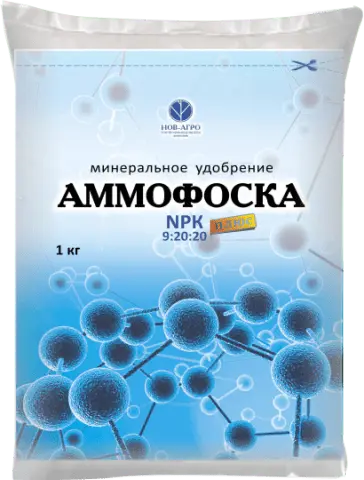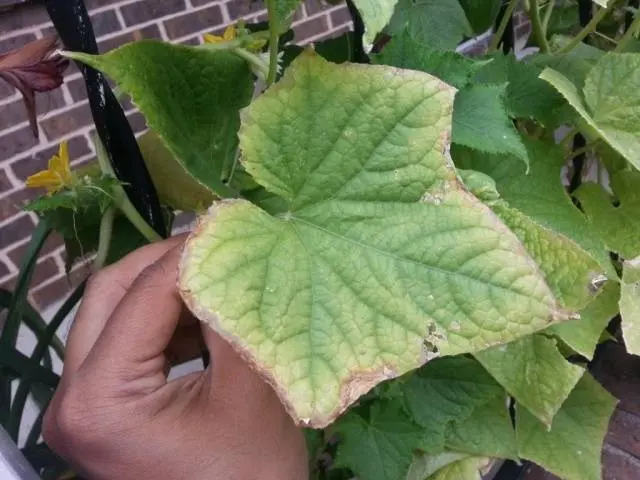Contents
After a long winter, the body requires a shock dose of vitamins and light food. Cucumbers are the vegetable that will come to the rescue of everyone. Harvest can be obtained in record time when growing a crop in a polycarbonate greenhouse.
Recently, many give their preference to greenhouses made of modern polymeric material. Cellular polycarbonate is durable, easy to install, retains heat well, transmits light, but scatters harmful ultraviolet radiation. Favorable conditions for plants are created in a polycarbonate greenhouse. With such a greenhouse, getting early cucumbers becomes a reality.
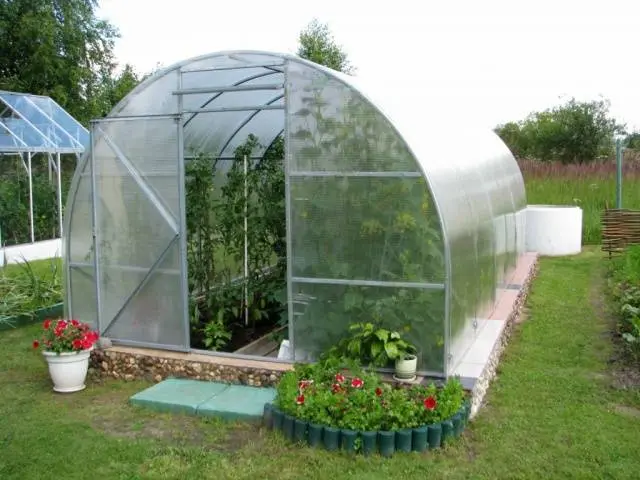
Growers need to provide temperature, humidity and nutrients to cucumbers for development and fruiting. The lack of nutrition in the soil can lead to various negative consequences: the fall of the ovaries, a change in the taste and appearance of cucumbers, yellowing of the leaves and the death of the plant.
Preparatory work in the greenhouse
In order not to bring the plants to the extreme, regular scheduled feeding, watering and temperature control in the greenhouse are required. For full development, cucumbers need vital nutrients: without nitrogen, leaves and shoots will not develop, without phosphorus and potassium there will be no fruits.
The basis for feeding cucumbers can be laid in the fall when preparing the soil in a polycarbonate greenhouse. After the crop is harvested, all the remains of plants and fruits are removed and disposed of in the greenhouse, the best option is burning. So, you will have an excellent fertilizer for the next season. Ash is perfectly stored in a tightly sealed dry container. Bacteria and fungi, which are pathogens, usually hibernate in plant residues. Be sure to get rid of potential threats.
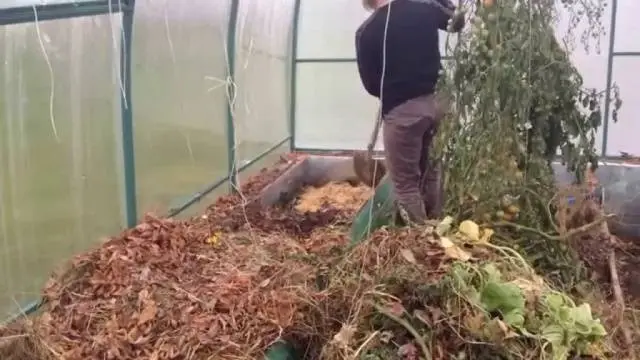
It is very well possible to disinfect the greenhouse from the inside using a sulfuric smoke bomb. Then prepare the soil for the next season. Dig along with manure, peat or humus.
The spring soil preparation for cucumbers includes digging and applying shortly before planting (about 10 days) a composition of: superphosphate, potassium salt, ammonium nitrate, potassium sulfate. Take each fertilizer, respectively, 25 g for each square. m of greenhouse soil. Cucumbers do not need to be fertilized directly when planting.
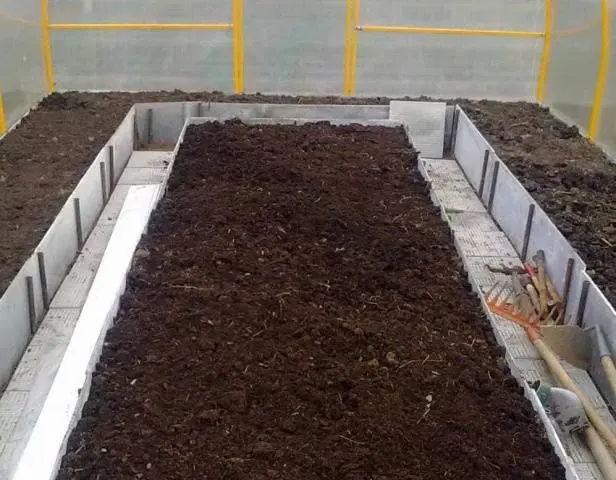
Fertilizers for cucumbers
During the growing season, cucumbers require 3, sometimes 4 top dressings with organic matter or mineral fertilizers, every 15 days. Watch a video about feeding cucumbers:
First feeding
After the cucumber seedlings are planted in the greenhouse, they are given time (10-15 days) to adapt. And only after that they carry out the first feeding of cucumbers in the greenhouse. For active growth and accumulation of green mass, plants require nitrogen. Therefore, at the initial stage, gardeners actively feed cucumbers with organic matter. Aqueous solutions are suitable for dressing cucumbers: from pet manure, bird droppings, “herbal tea”, ash, yeast.
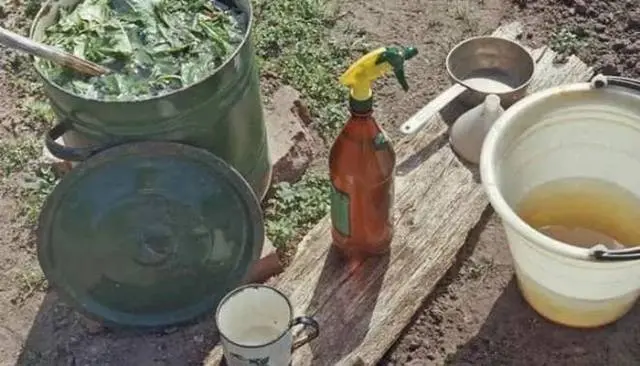
Recommended dosages for the preparation of solutions based on slurry: 1 part infusion to 10 parts water; based on bird droppings: 1/15; herbal tea is diluted 1-2/10. Ash solution for feeding cucumbers is prepared in different ways. Add a glass of ash to a bucket of water, mix well. The solution is ready and you can water the cucumbers with it.
You can make an ash extract: pour half a glass of ash with hot water (1 l), mix thoroughly, put on the stove, bring to a boil and boil for 15-30 minutes. Infuse the concentrate for 5 hours, then bring to readiness by adding a bucket of water (usually 10 liters). You can water cucumbers. But it is much more efficient to use an ash extract for foliar spraying of cucumbers in a greenhouse. Spraying “on the leaf” acts in the shortest possible time. What is especially important if you saw the first signs of a lack of nitrogen: an oppressed appearance of cucumbers, yellowing of leaf plates, fading in growth.
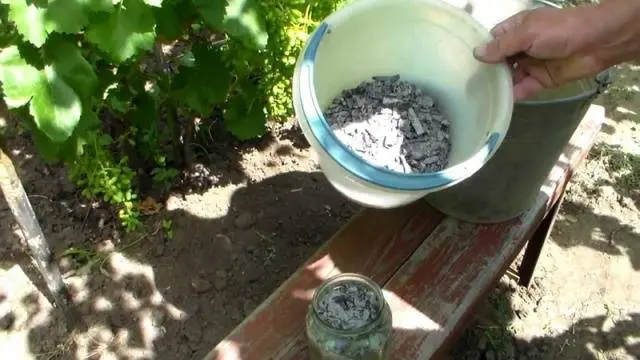
Top dressing of cucumbers in the greenhouse with baker’s yeast is also practiced among amateur gardeners. Buy regular yeast (live in packs or dry granular). Dilute in a bucket of water, adding a little sugar, let the solution stand for 2 hours, so that the yeast begins its vital activity. Yeast acts on cucumbers as a kind of growth stimulator. It is noticed that plants after yeast feeding become more viable, become more active in growth.
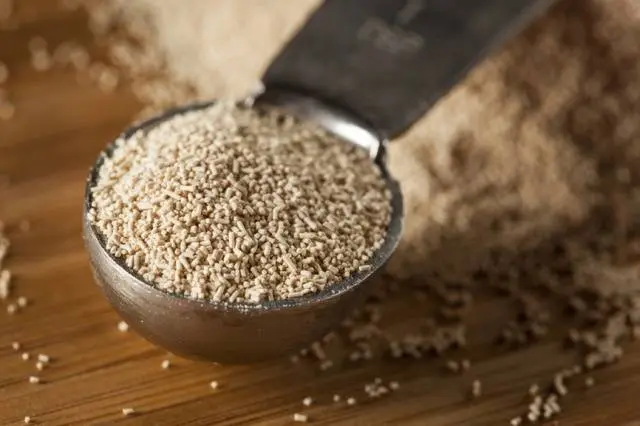
Those who do not have the opportunity to use organic matter to feed cucumbers in a greenhouse successfully use mineral fertilizers. Several options for the first feeding of cucumbers using mineral fertilizers:
- Ammonium nitrate, potassium sulfate, 15 g each, respectively, superphosphate – 40 g or double superphosphate – 20 g. The mineral mixture for feeding cucumbers is diluted in 10 liters of water;
- Ammophoska (30 g) is applied per 1 sq. m of soil. In the composition of ammophoska, nitrogen is in last place (12%), however, this fertilizer should not be excluded from the list for feeding cucumbers at the first stage, since the fertilizer has a complex but balanced composition. Plants will receive complex top dressing. In addition to nitrogen, ammofoska contains phosphorus and potassium, which are the main nutrients for cucumbers in a greenhouse, and sulfur, an element that promotes the absorption of nitrogen. Fertilizer can be used as an independent top dressing for cucumbers, or in combination with other types of fertilizers;

- Azofoska is a complex fertilizer that consists of 3 components: nitrogen, phosphorus and potassium. In terms of percentage, nitrogen is in first place. For different manufacturers, indicators may differ from 16-27%. It is recommended to apply in the form of granules 30-45 g, placing on 1 sq. m of soil, in the form of an aqueous solution of 20-30 g / bucket of water;
- Carbamide (1 tablespoon), superphosphate (60 g) add to 10 liters of water, pour cucumbers with a solution;
- Ammonium nitrate, superphosphate, potassium salt. Take 10 g of each fertilizer for feeding cucumbers, place in a 10-liter bucket of water and stir.
When carrying out the first top dressing, plants should receive nutrients for the growth of leaves, stems and shoots.
Second feeding
The second top dressing of greenhouse cucumbers is carried out when the plants have bloomed for the maximum number of ovaries formed. If at this stage the cucumbers do not have enough potassium, then flowering may stop, and the resulting ovaries will fall off.
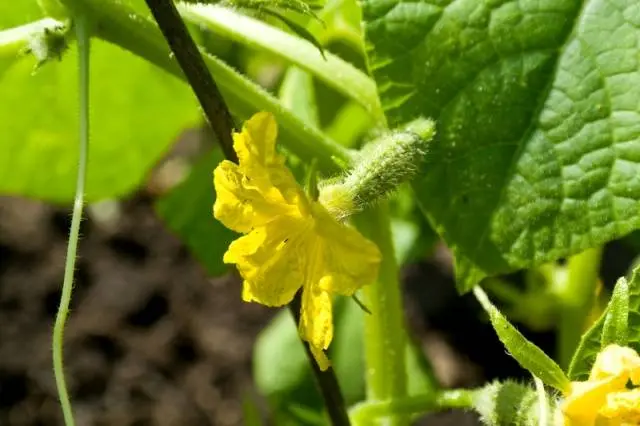
- Measure out potassium nitrate in a volume of 20 g, ammonium nitrate and superphosphate (30 and 40 g each, respectively). Mix everything in a 10-liter bucket of water, use to feed cucumbers in a greenhouse;
- A solution of potassium nitrate (25 g / bucket of water) can be used for foliar spraying of cucumbers, the effect of the solution through the leaves is faster. The solution is used for planned feeding, and its use is especially indicated when the first signs of potassium deficiency are noticed: ovary fall, inactive flowering and yellowing of the leaves from the edge;

- Kalimagensia can be used to fertilize cucumbers in a greenhouse. Chlorine in the fertilizer contains only 1%, but a very high content of potassium – 30%. To fertilize 1 sq. m plantings, take 35 g of potassium magnesia.
The third top dressing
For the third time, cucumbers must be fed during the period of mass fruiting, when all the forces of the plant are directed to the harvest. At this time, it is necessary to feed cucumbers in a polycarbonate greenhouse with fertilizers containing phosphorus, potassium and nitrogen with sulfur. Sulfur is necessary, because in its presence, nitrogen is absorbed as efficiently as possible. Phosphorus is necessary for slow ripening of cucumbers in a greenhouse and if the fruits grow crooked and tasteless.
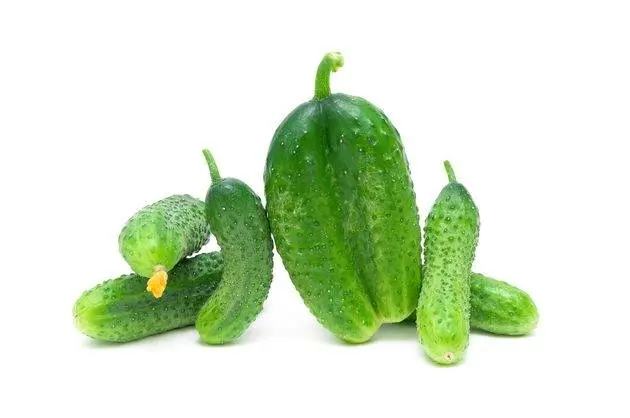
To correct the situation, use the following composition for feeding: ash (150 g), potassium nitrate (30 g), carbamide (50 g). Everything together dissolves in 10 liters of water.
Ammophos – a fertilizer with a high phosphorus content acts quickly. This enables gardeners to use fertilizer on a planned basis and in cases where an ambulance is required for plants. Regardless of how you will apply ammophos: between rows (30-50 g per sq. M) or in dissolved form (20-30 g per 10 liters of water), the fertilizer is quickly absorbed by cucumbers. The culture bears fruit better, the taste of cucumbers improves, the fruits are even, without flaws.
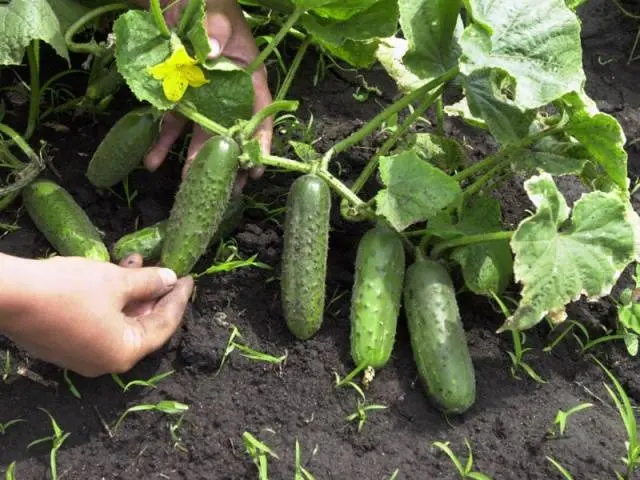
The fourth fertilizing
The fourth dressing of cucumbers in the greenhouse should contain all the main nutrients. It is carried out in order to prolong the vegetation and fruiting of the crop. Cucumbers respond very well to the introduction of an ash solution, top dressing with “herbal tea” from nettles or soda solution (30 g per 10 liters of water).
You can use complex ready-made fertilizers for cucumbers in the greenhouse: Kemira, Agricola, Pum, Crystal and others. Manufacturers indicate dosage information for feeding cucumbers in a greenhouse.
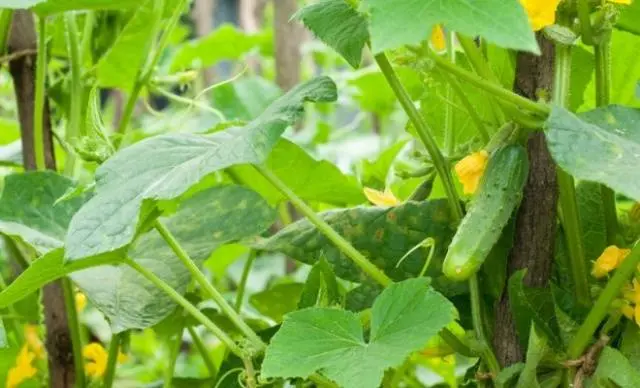
Top dressing “on the leaf” is perceived by plants with great effect under adverse climatic conditions.
Fundamentals of agricultural technology when growing cucumbers in a greenhouse
Polycarbonate greenhouses can now be found in almost every summer cottage. Still, the cultivation of cucumbers in a greenhouse is a vital necessity in the climate.
Care in a polycarbonate greenhouse is somewhat different from caring for plants in the open field, as it requires compliance with watering conditions, temperature conditions and a schedule for feeding cucumbers.
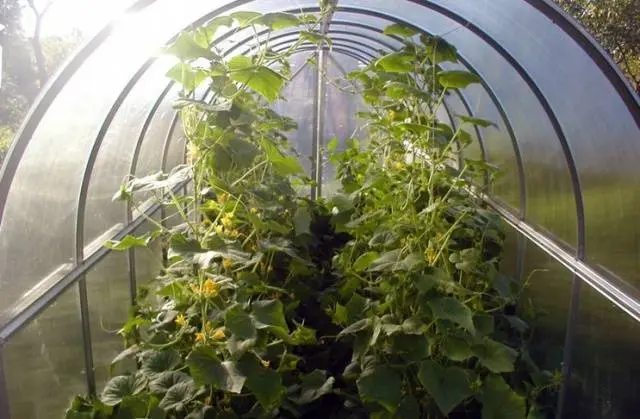
Watering
Cucumbers in a polycarbonate greenhouse need frequent watering, especially during fruit ripening. Most often, gardeners water from a watering can or use hoses with nozzles. But it is much more efficient to organize irrigation by sprinkling. To do this, hoses with holes are pulled along the top of the greenhouse through which water passes.
At least 7-8 liters of water should be spent on each plant twice a week. In hot weather, watering in a polycarbonate greenhouse is done more often. Watering can is very difficult to provide watering in the required volume.
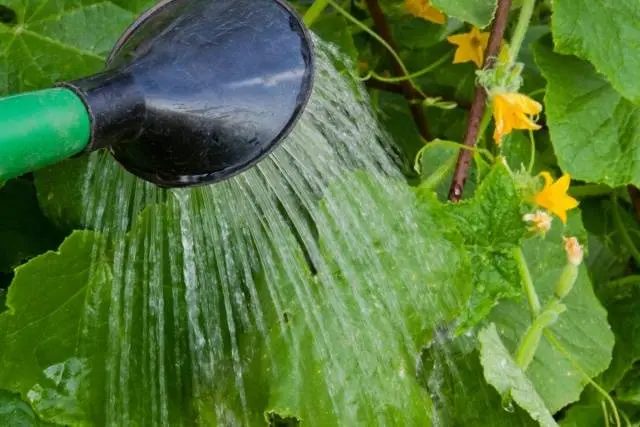
Temperature conditions
When cultivating cucumbers in a polycarbonate greenhouse, it is important to provide the necessary temperature conditions:
- On sunny days +24+28 degrees;
- In the absence of the sun +20+22 degrees;
- At night +16+18 degrees.
Only under such conditions will cucumbers be able to successfully grow and bear fruit, absorbing the nutrients that caring gardeners feed them.
Too high temperatures are regulated by opening doors or vents in a polycarbonate greenhouse.
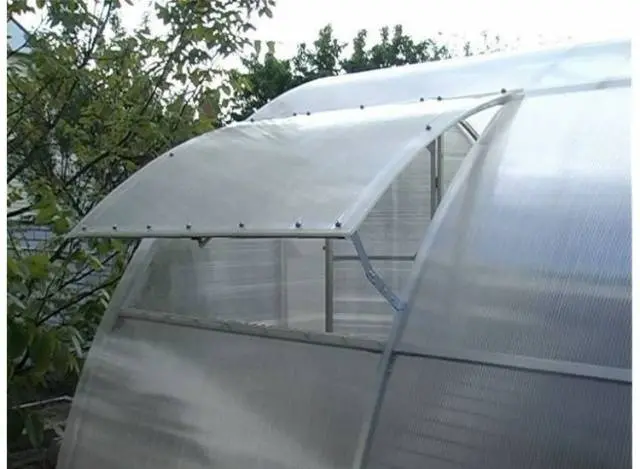
Avoid sudden changes in the temperature regime of the greenhouse, which will also not benefit the plants, as it can cause disease, weakening, and poor taste in fruits.
Cucumbers love 80-90% humidity. In a polycarbonate greenhouse, the moisture issue is solved by spraying and frequent watering.
Soil temperature should not be higher than +22 +24 degrees. This can be achieved using mulch. By mulching the soil, it is also achieved that the soil in the polycarbonate greenhouse retains moisture well, beneficial organisms, worms, and beetles usually work under the mulch, which loosen the soil. Looseness of the soil is very important for cucumbers, as oxygen enters through the pores to the roots of the crop. As mulch, cut grass, sawdust, agrofibre are used.
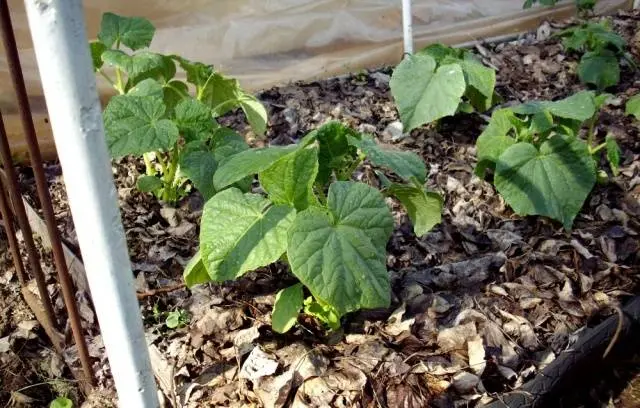
Sprinkle bare roots with soil in time. This procedure promotes the formation of additional lateral roots.
stem formation
A fruiting plant should have a certain structure, which begins to form with the appearance of 3-4 pairs of leaves. The lateral shoots that form in the first axils are plucked out along with the flowers. So, the main stem will focus on further growth.
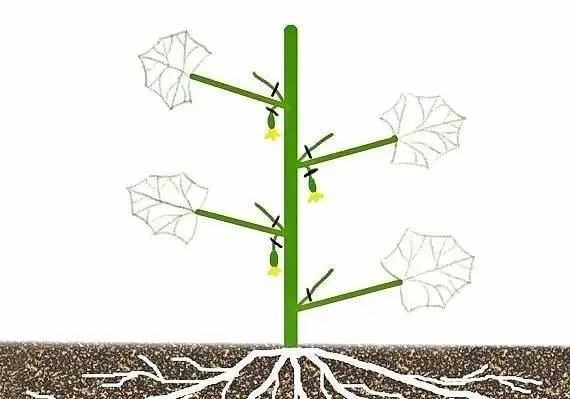
Next, count 3-4 internodes. In them, the side shoots should be pinched, leaving a couple of leaves and a few cucumbers.
In the next 3 internodes at the side shoots, leave 2 leaves and 2 ovaries, pinching the top. At the top shoots, also pinch the growth point, leaving 3 leaves and 3 ovaries on each shoot.
The length of the main stem should not exceed 1,5 -2 m. The cucumber lash is attached to the trellis by tying it with twine. The twine is tied loosely over 2-3 sheets and attached to the trellis.
The role of the trellis is performed by a wire, which is stretched at a height of about 2 m through the entire greenhouse. Gradually, as the stem grows, wrap it around the prepared twine.
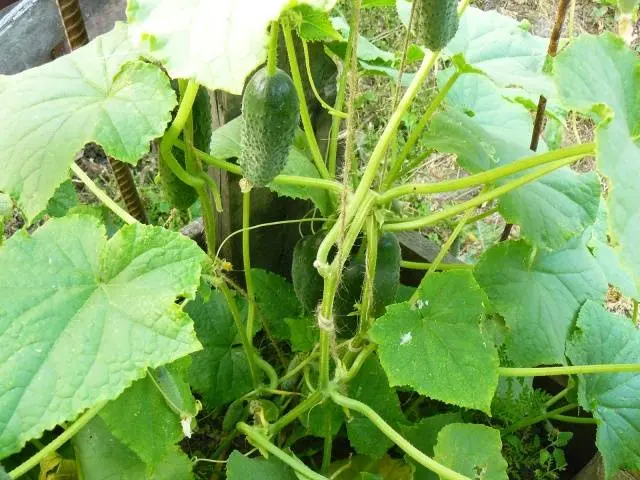
Harvesting
Regular harvesting in a polycarbonate greenhouse stimulates cucumbers for further fruit formation. If you do not pick cucumbers on time, they will overgrow and become unfit for food. Moreover, all the forces of the plant are directed to the overgrown cucumber so that the seeds ripen in it. New fruits will not form.
Harvesting in a greenhouse, once a day, you direct the forces of the plant to the formation of new ovaries and fruits. The plant will strive to leave its offspring in each new fruit.
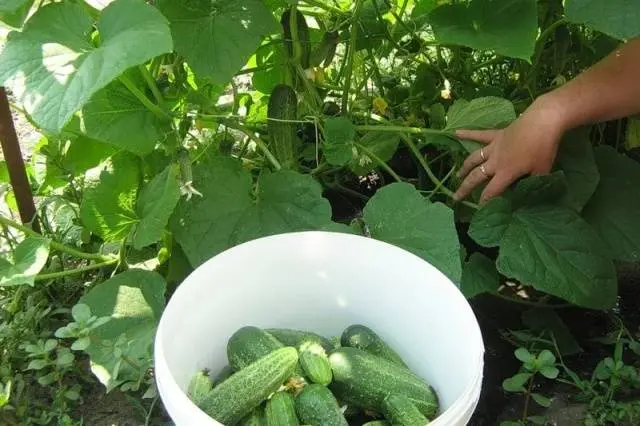
Conclusion
There are no tips and recommendations that are the same for everyone, such that you can grow a fantastic crop of cucumbers. The reason is that all gardeners have different types of soil, climatic conditions. However, work and attention to your plants in a polycarbonate greenhouse, as well as adherence to basic agricultural practices, timely actions to feed and correct the situation due to a lack of nutrients will bring you closer to the crop of cucumbers that you want to brag about.










